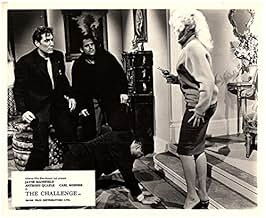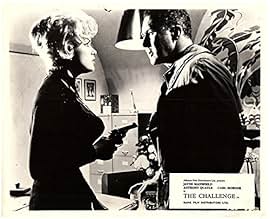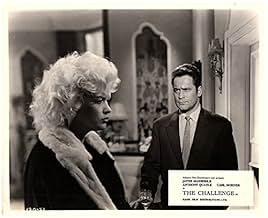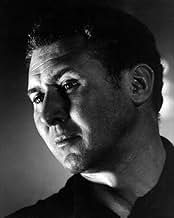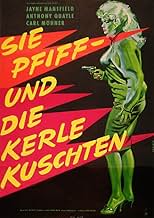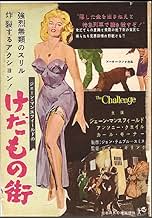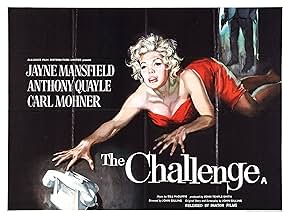A gang leader dumps her criminal boyfriend when he is convicted of robbery, but he recovers the stolen loot once he's released. In retaliation, the gang kidnaps his son and demands the money... Read allA gang leader dumps her criminal boyfriend when he is convicted of robbery, but he recovers the stolen loot once he's released. In retaliation, the gang kidnaps his son and demands the money as ransom.A gang leader dumps her criminal boyfriend when he is convicted of robbery, but he recovers the stolen loot once he's released. In retaliation, the gang kidnaps his son and demands the money as ransom.
Featured reviews
We often forget that director John Gilling was not only a horror film specialist, but also a crime and adventure yarns provider. This one THE CHALLENGE, PICK UP ALLEY, THE MAN INSIDE, TIGER BY THE TAIL...and I don't even speak of his first thrillers, are the best proof. This one shows Anthony Quayle, for once, in a lead character, and Carl Möhnner in a supporting one, seven years after RIFIFI. And in RIFIFI, Carl Möhner's son was kidnapped, and a jewels' ransom was asked against the child's release. Here Carl Moehner's character kidnaps a little boy, for the same purpose !!! The total contrary... Beware, this film is not as gritty nor terrific as the Jules Dassin's movie, far far tougher. But it remains a pretty good British crime actioner, in a period where UK film industry still made good stuff, unlike now, in 2024, where most of the crime and gangster movies are made for straight to DVD or streaming platforms market.
When you watch a British crime film from the 1950s you expect that the gang boss will be played by Herbert Lom,or Martin Benson or maybe Eric Pohlman,but Jayne Mansfield!\whereas Joan Crawford is a tigress when she is a gang boss,Eg Johnny Notorious,Mansfield is a pussycat.She has all the toughness of a rotten tomato.Once the going gets tough she gets going and Carl Mohne takes over.The best she can do is simper in a variety of wigs and a different outfit for every scene.She simpers a song in a sort of Monroe imitation.She is in short dreadful.Quayle plays against type as her crook lover who went to prison but kept the loot.If you were to take Monroe out of this film you would have a good film.Nevertheless when Mansfield is off the screen the film is quite entertaining.
One of the better London-based crime films of the 1950s/1960s to appear on the Talking Pictures channel. It was interesting to see Anthony Quayle as something of an underdog, and I always puzzle about Edward Judd's transformation as an actor. In "The Challenge", he looks a bit seedy, not helped by unflattering baldness, whereas after some 50 years I can still recall his screen presence in some TV series or other - helped by a toupee, a bit of burliness and a smart suit.
I have a feeling that, as with so many films, the regional railway stock and the London terminus didn't match. (And even in those days did drivers really leave ignition keys in their cars?) Despite what others have said, I thought that Jayne Mansfield was adequate, though I fast-forwarded through her song.
The poster for the film shown here on IMDb titillates misleadingly. I'm not sure who the cavorting lady is - Billy before she went blonde or the stripper whose act we never got to see completely?
I have a feeling that, as with so many films, the regional railway stock and the London terminus didn't match. (And even in those days did drivers really leave ignition keys in their cars?) Despite what others have said, I thought that Jayne Mansfield was adequate, though I fast-forwarded through her song.
The poster for the film shown here on IMDb titillates misleadingly. I'm not sure who the cavorting lady is - Billy before she went blonde or the stripper whose act we never got to see completely?
If someone else played Billy instead of Jayne Mansfield it could've been better. Lots of good characters actors here to keep it going and quite violent considering. Anthony Quayle was as good as usual.
It is sometimes said that the age of film noir was over by the end of the fifties; Orson Welles's "Touch of Evil" from 1958 is sometimes regarded as marking the end of the line. This may be true of America, the genre's original home, but in Britain noir survived into the sixties. This may be because we were slower than America to adopt colour television, meaning that there was still a market for black-and-white films here. "The Challenge" from 1960 is an example of later British noir. (In America it was shown as "It Takes a Thief", but I will use the original British title).
Jim Maxton, a lorry driver and petty criminal, is persuaded by his gang leader lover Billy to take part in a big robbery. (And no, this isn't a rare example of a film from the early sixties with a gay theme. Although the cast-list spells her name as "Billy" rather than "Billie", she is a woman). He is betrayed to the police, arrested, convicted and sentenced to eight years in jail, of which he serves five, while the rest of the gang remain at liberty. Upon release, Maxton tries to go straight and resumes his career as a lorry driver, but it turns out that he is the only one of the gang who knows where the loot from the robbery is buried. In an attempt to force him to reveal its whereabouts, his former partners in crime kidnap his young son Joey and threaten the boy's life.
Contrary to what one reviewer states, Jayne Mansfield was not a starlet at the start of her career when she made this film. Her career as a Hollywood leading lady was a relatively short one, largely because she was seen as a sort of poor man's Marilyn Monroe. She was not without acting talent, but producers preferred to cast her in undemanding roles in light comedies which showcased her voluptuous figure. (Something similar happened with Diana Dors in Britain). By 1960 her popularity in America was waning, and she tried to reinvent herself in Europe. This was her only British film, but she was also to appear in Italian, German and Greek ones.
Mansfield is not particularly convincing as a female London gang boss, especially as her accent seems stuck halfway across the Atlantic, and we are never sure whether Billy is supposed to be completely ruthless or whether she is partly redeemed by a softer side to her nature. There are better performances from the actors playing two other members of the gang, Carl Möhner as Kristy and Peter Reynolds as Buddy. Kristy, who definitely has no softer side to his nature, is Maxton's rival for Billy's affections and probably the man who informed on Maxton to the police. As for Buddy he is not so much ruthless as psychopathic; he has responsibility for guarding the kidnapped Joey and devises a sadistic scheme to bring about the boy's death and make it look like an accident.
The best acting, however, comes from Anthony Quayle as Maxton. Quayle was a leading light in the British theatre, both as actor and director, but never had quite the same success in the cinema, possibly because (unlike, say, Olivier or Burton) he never really had the looks to be a matinee idol. Most of his films were British- he never attempted to conquer Hollywood- and he mostly appeared in supporting roles. In "The Challenge", however, he had a chance to play a leading role, and made the most of it. His Maxton, despite his criminal past, is a man with a certain decency, far more so than the other members of his gang, and the nearest thing the film has to a hero. In some ways the film is a standard crime thriller, but Quayle's performance, together with a well-written script and a suspenseful ending, is the main reason why it deserves an above-average mark. 6/10.
Jim Maxton, a lorry driver and petty criminal, is persuaded by his gang leader lover Billy to take part in a big robbery. (And no, this isn't a rare example of a film from the early sixties with a gay theme. Although the cast-list spells her name as "Billy" rather than "Billie", she is a woman). He is betrayed to the police, arrested, convicted and sentenced to eight years in jail, of which he serves five, while the rest of the gang remain at liberty. Upon release, Maxton tries to go straight and resumes his career as a lorry driver, but it turns out that he is the only one of the gang who knows where the loot from the robbery is buried. In an attempt to force him to reveal its whereabouts, his former partners in crime kidnap his young son Joey and threaten the boy's life.
Contrary to what one reviewer states, Jayne Mansfield was not a starlet at the start of her career when she made this film. Her career as a Hollywood leading lady was a relatively short one, largely because she was seen as a sort of poor man's Marilyn Monroe. She was not without acting talent, but producers preferred to cast her in undemanding roles in light comedies which showcased her voluptuous figure. (Something similar happened with Diana Dors in Britain). By 1960 her popularity in America was waning, and she tried to reinvent herself in Europe. This was her only British film, but she was also to appear in Italian, German and Greek ones.
Mansfield is not particularly convincing as a female London gang boss, especially as her accent seems stuck halfway across the Atlantic, and we are never sure whether Billy is supposed to be completely ruthless or whether she is partly redeemed by a softer side to her nature. There are better performances from the actors playing two other members of the gang, Carl Möhner as Kristy and Peter Reynolds as Buddy. Kristy, who definitely has no softer side to his nature, is Maxton's rival for Billy's affections and probably the man who informed on Maxton to the police. As for Buddy he is not so much ruthless as psychopathic; he has responsibility for guarding the kidnapped Joey and devises a sadistic scheme to bring about the boy's death and make it look like an accident.
The best acting, however, comes from Anthony Quayle as Maxton. Quayle was a leading light in the British theatre, both as actor and director, but never had quite the same success in the cinema, possibly because (unlike, say, Olivier or Burton) he never really had the looks to be a matinee idol. Most of his films were British- he never attempted to conquer Hollywood- and he mostly appeared in supporting roles. In "The Challenge", however, he had a chance to play a leading role, and made the most of it. His Maxton, despite his criminal past, is a man with a certain decency, far more so than the other members of his gang, and the nearest thing the film has to a hero. In some ways the film is a standard crime thriller, but Quayle's performance, together with a well-written script and a suspenseful ending, is the main reason why it deserves an above-average mark. 6/10.
Did you know
- TriviaThe train set bought for Joey has the name Rovex on the box. This was a name used by the Triang company which manufactured OO scale model railways. However, the actual train set in the movie appears to be a much larger Hornby O scale set.
- GoofsIt is never explained why the lorry drivers decide to attack Jim and tie him up rather than help him to retrieve the loot.
- ConnectionsFeatured in Neil Sean Meets...: Stars & Friends of Jayne Mansfield (2015)
- SoundtracksThe Challenge
Lyrics by Robert Halfin
Music by Bill McGuffie (as William McGuffie)
Performed by Jayne Mansfield (dubbed by Joan Small) (uncredited)
- How long is It Takes a Thief?Powered by Alexa
Details
- Release date
- Country of origin
- Language
- Also known as
- Sie pfiff - und die Kerle kuschten
- Filming locations
- Production company
- See more company credits at IMDbPro
- Runtime
- 1h 41m(101 min)
- Color
- Aspect ratio
- 1.37 : 1
Contribute to this page
Suggest an edit or add missing content

